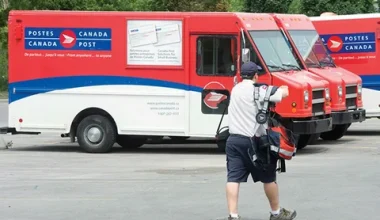Canada, known for its high standard of living, cultural diversity, and robust economy, is an attractive destination for individuals seeking employment opportunities abroad. Among the many thriving sectors, the logistics industry stands out, offering a range of high-paying jobs that are essential to keeping Canada’s expansive geography interconnected. The logistics sector encompasses transportation, warehousing, supply chain management, and distribution, making it one of the most dynamic and critical industries in the country.
For individuals specializing in logistics—whether as truck drivers, warehouse managers, or supply chain analysts—Canada presents abundant opportunities. The government’s openness to welcoming foreign workers, particularly in industries facing a labor shortage, makes it possible for qualified logistics professionals to immigrate and secure lucrative positions. Visa sponsorship is also available, especially for driving jobs that play a crucial role in maintaining Canada’s supply chain.
Navigating Canada’s immigration pathways for logistics jobs may seem daunting, but with the right strategy and understanding of the immigration process, your goal of working in Canada can become a reality. In this guide, we will explore the various immigration options available for logistics professionals, the most in-demand jobs, and the steps you can take to secure visa sponsorship for driving and other high-paying logistics roles.
Apply Also: Dairy Farm Worker needed with Visa sponsorship in Canada (Salary $18/Hr)
Understanding the Logistics Job Market in Canada
Canada’s logistics sector is a booming industry, driven by the country’s large geographic size and the increasing need for efficient supply chain management. Logistics encompasses the movement of goods from suppliers to consumers, and its significance has only grown with the rise of e-commerce and international trade. This sector includes roles in transportation, warehousing, freight forwarding, and inventory management, all of which are integral to keeping the economy running smoothly.
1. Demand for Skilled Professionals: With its vast landscape and reliance on both domestic and international trade, Canada consistently needs logistics professionals. The demand for truck drivers, in particular, is notable, with companies frequently reporting a shortage of skilled drivers to meet increasing transportation needs. This shortage has led many employers to seek international talent and sponsor foreign workers, particularly in regions like Alberta, Ontario, and British Columbia.
2. Types of High-Paying Jobs in Logistics: The logistics sector offers a variety of high-paying roles. These include logistics managers, supply chain analysts, and warehouse supervisors, as well as specialized truck driving positions. Long-haul truck drivers, who are responsible for transporting goods across provinces and into the United States, often earn substantial salaries, with the added benefit of visa sponsorship in many cases. Supply chain managers and analysts also command competitive salaries, with opportunities to work in multinational companies.
3. Industry Growth: The growth of e-commerce platforms like Amazon and Shopify has created additional demand for logistics professionals. Canada’s role as a key trade partner with the United States and other global markets also requires a strong logistics network. As companies expand their operations, the need for skilled workers continues to grow, making the logistics industry a stable and lucrative field for immigrants.
4. Provincial Variations: Each province in Canada has varying levels of demand for logistics professionals. For instance, Alberta’s oil and gas sector requires extensive logistics support, including the transportation of materials and equipment. Ontario, with its manufacturing hubs, and British Columbia, home to major ports and international trade routes, also present significant opportunities. Identifying provinces where your skills are most needed can increase your chances of securing employment and obtaining visa sponsorship.
Visa Sponsorship for Driving Jobs in Canada
Driving jobs are the backbone of the logistics industry in Canada, particularly for long-haul and commercial truck drivers. Due to a shortage of qualified drivers, many Canadian employers are willing to sponsor visas for foreign workers who can fill these essential roles.
1. Overview of Driving Jobs: Driving jobs in Canada range from local delivery drivers to long-haul truck drivers who transport goods across provinces or internationally. The most in-demand roles are for Class 1 truck drivers, who are licensed to operate large tractor-trailers and heavy trucks. These positions often come with competitive salaries, with some drivers earning between CAD 55,000 and CAD 75,000 per year. Additionally, these jobs typically offer benefits such as health insurance, pension plans, and paid time off.
2. Labor Market Impact Assessment (LMIA): To hire foreign workers for driving jobs, employers must first obtain a Labor Market Impact Assessment (LMIA) from Employment and Social Development Canada (ESDC). The LMIA process involves proving that there are no qualified Canadian citizens or permanent residents available to fill the position, thus justifying the need to hire a foreign worker. Once the LMIA is approved, the employer can extend a job offer to the foreign worker, which is a crucial step in securing a work visa.
3. Visa Sponsorship Programs: Foreign workers hired through an LMIA can apply for a work permit under the Temporary Foreign Worker Program (TFWP). Once in Canada, it’s possible to transition from a temporary work permit to permanent residency, particularly if the job is in high demand. Some provinces also have specific streams under their Provincial Nominee Programs (PNPs) designed to fast-track permanent residency for truck drivers and other essential logistics workers.
4. Required Qualifications for Driving Jobs: To qualify for driving jobs with visa sponsorship, you must meet several requirements. First, you need to have a valid driver’s license, preferably a commercial or heavy vehicle license, from your home country. In most cases, you will also need to pass a medical exam, submit proof of driving experience, and possibly undergo training to meet Canadian standards. Employers may also look for drivers with clean driving records and basic proficiency in English or French.
Express Entry System for Skilled Workers in Logistics
The Express Entry system is Canada’s most popular immigration pathway for skilled workers, including those in the logistics field. It operates on a points-based system, with candidates ranked according to their Comprehensive Ranking System (CRS) score.
1. Eligible Occupations for Logistics Professionals: Logistics professionals can apply through the Express Entry system if their occupation is classified under the National Occupational Classification (NOC) system. Occupations such as logistics managers, supply chain coordinators, and transportation supervisors typically qualify under the Federal Skilled Worker Program. Having work experience in these roles can help you accumulate points toward your CRS score, increasing your chances of receiving an Invitation to Apply (ITA) for permanent residency.
2. Comprehensive Ranking System (CRS): The CRS is used to rank candidates in the Express Entry pool based on factors such as age, education, work experience, and language proficiency. For logistics professionals, having a higher level of education, such as a bachelor’s or master’s degree in supply chain management, can boost your CRS score. Additionally, work experience in Canada or a valid job offer from a Canadian employer can significantly increase your score.
3. Steps to Apply: To apply through Express Entry, you must first create an online profile and submit details about your qualifications. Once your profile is in the pool, you will be ranked based on your CRS score. If you receive an ITA, you will have 60 days to submit a complete application for permanent residence, which includes providing proof of your work experience, education, and language proficiency.
4. Advantages of Express Entry: One of the key advantages of Express Entry is its speed. Most successful applicants receive their permanent residency within six months of submitting their application. Additionally, Express Entry allows you to bring your family members to Canada, and once you have permanent residency, you can work for any employer and move freely within the country.
Provincial Nominee Programs (PNPs) for Logistics Workers
While the Express Entry system is a federal program, each Canadian province also has its own Provincial Nominee Program (PNP) designed to attract skilled workers to their region. Many PNPs offer streams tailored specifically for logistics professionals, including truck drivers and supply chain specialists.
1. Overview of PNPs: Provincial Nominee Programs allow provinces to nominate individuals for permanent residency based on their labor market needs. If you are nominated through a PNP, you will receive additional points toward your Express Entry CRS score, increasing your chances of receiving an ITA. Some provinces also offer direct pathways to permanent residency for workers in high-demand occupations, including logistics.
2. Popular PNPs for Logistics Workers: Provinces such as Alberta, Ontario, and British Columbia have PNP streams targeting logistics workers. For example, the Alberta Immigrant Nominee Program (AINP) offers the Employer-Driven Stream, which allows employers in logistics and transportation to nominate foreign workers for permanent residency. Similarly, the Ontario Immigrant Nominee Program (OINP) and the British Columbia Provincial Nominee Program (BC PNP) have streams that prioritize skilled workers in logistics.
3. Benefits of PNPs: One of the primary benefits of PNPs is the ability to receive a provincial nomination, which guarantees an invitation to apply for permanent residency. In many cases, PNPs also provide faster processing times than federal immigration programs. Additionally, being nominated by a province indicates that your skills are in high demand, which can make it easier to find employment once you arrive in Canada.
4. Steps to Apply through a PNP: To apply through a PNP, you must first receive a job offer from an employer in the province. Some PNPs also accept applications from individuals who have previous work experience or a degree from a Canadian institution. Once you receive a provincial nomination, you can apply for permanent residency either through the Express Entry system or directly to IRCC, depending on the program.
Apply Also: 8 Canadian Citizenship Revocation Reasons and Legal Implications
Temporary Foreign Worker Program (TFWP) for Logistics Jobs
For those looking to work in Canada on a temporary basis before transitioning to permanent residency, the Temporary Foreign Worker Program (TFWP) offers an alternative route. This program allows employers to hire foreign workers to fill labor shortages in specific industries, including logistics.
1. Overview of the TFWP: The TFWP is designed to help Canadian employers hire foreign workers when no suitable Canadian citizens or permanent residents are available for the job. This program is often used for hiring truck drivers and warehouse workers, particularly in regions with high demand for labor. Under the TFWP, workers can be granted temporary work permits, which can later be converted into permanent residency through programs like the Canadian Experience Class (CEC).
2. LMIA Process for the TFWP: To hire a foreign worker through the TFWP, employers must first obtain an LMIA from ESDC. The LMIA process involves demonstrating that the employer has made efforts to hire locally but has been unable to find qualified candidates. Once the LMIA is approved, the employer can extend a job offer, allowing the foreign worker to apply for a temporary work permit.
3. Pathways to Permanent Residency: One of the key advantages of the TFWP is the ability to transition from a temporary work permit to permanent residency. After gaining Canadian work experience, temporary foreign workers may qualify for the Canadian Experience Class (CEC) program, which is one of the streams under the Express Entry system. Many provincial PNPs also prioritize workers who have gained Canadian experience, making it easier to obtain permanent residency through the TFWP.
4. Challenges and Considerations: While the TFWP provides a viable option for working in Canada, it is important to note that the program has certain limitations. Temporary work permits are typically tied to a specific employer, meaning that changing jobs may require applying for a new work permit. Additionally, workers under the TFWP may not have access to the same benefits as permanent residents, such as healthcare and social services, unless they transition to permanent residency.
Apply Also: Canada Post Jobs Hiring Now For Various Locations In Ontario
Steps to Immigrate for High-Paying Logistics Jobs in Canada
1. Research the Job Market: Before beginning the immigration process, it is crucial to research the logistics job market in Canada. Identify regions where your skills are most needed and explore potential employers who are willing to sponsor your visa.
2. Choose the Right Immigration Pathway: Depending on your qualifications and experience, you can choose between several immigration pathways, including Express Entry, PNPs, and the TFWP. Each pathway has its own requirements and benefits, so it is important to select the one that aligns with your goals.
3. Prepare Your Application: Once you have chosen your immigration pathway, gather the necessary documentation, including proof of work experience, educational credentials, and language test results. Ensure that all documents meet the requirements of IRCC and any relevant provincial authorities.
4. Apply for a Job Offer: Securing a job offer from a Canadian employer can significantly enhance your chances of success. Many employers in the logistics industry are willing to sponsor visas for qualified foreign workers, particularly in regions facing labor shortages.
Conclusion
Immigrating to Canada for high-paying logistics jobs is a rewarding opportunity for skilled professionals looking to build a successful career in a stable and growing industry. Whether you are a truck driver seeking visa sponsorship or a logistics manager looking to secure permanent residency, Canada offers multiple pathways to achieve your goals. By researching the job market, understanding the immigration process, and preparing your application thoroughly, you can take the first steps toward a prosperous future in Canada’s logistics sector.










6 comments
Good
Hi l am single l does not any kind of work l am 24 Year old
How old are you?
I’m 36years old.
I am interested
Ok. Read the instructions before applying.